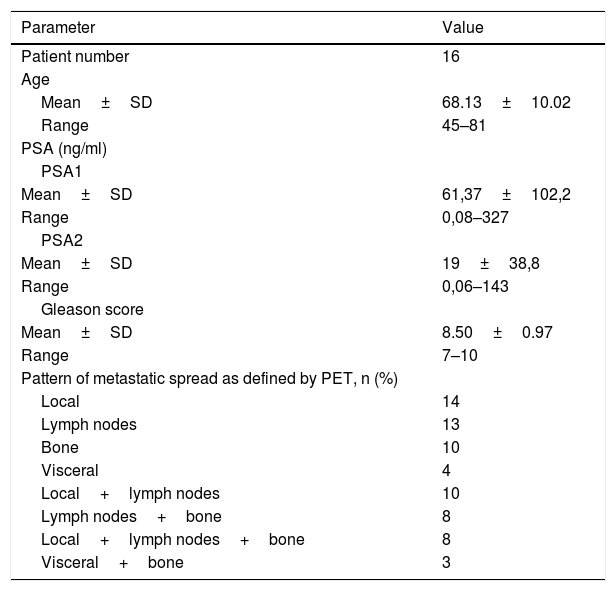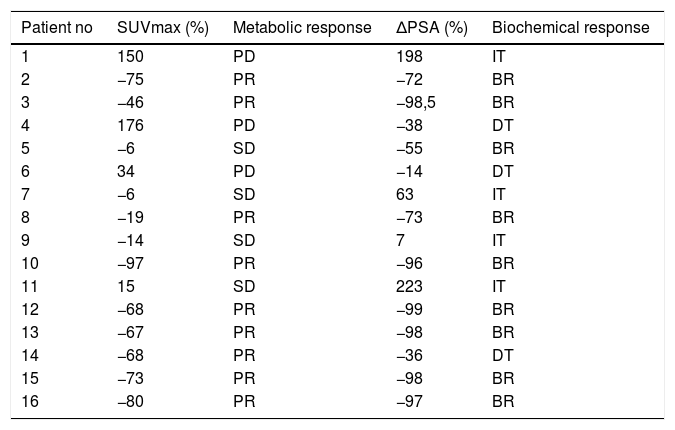There have been only few studies investigating the role of PSMA ligands in the therapy response assessment of metastasized castration resistant prostate cancer (mCRPC) cases. In this study we aimed at evaluating the capability of 68Ga- prostate-specific membrane antigen (PSMA) -I&T positron emission tomography/computerized tomography (PET/CT) in the assessment of therapeutic response in patients under docetaxel therapy for prostate cancer (PCa).
Material and methodsThe clinical records of all mCRPC patients treated with docetaxel and referred to our department for 68Ga-PSMA I&T PET/CT imaging were retrospectively analysed. Sixteen patients (mean age 69 years, range 52–82 years) with castration-resistant prostate cancer patients receiving palliative docetaxel therapy and had undergone 68Ga-PSMA I&T PET/CT scan were included in the study. 68Ga-PSMA I&T PET/CT imaging was done and prostate specific antigen (PSA) levels were measured at baseline before administration of docetaxel (PET1) and after at least 3 cycles (range 4–12) of chemotherapy (PET2). Patient-based as well as lesion-based comparison of PET2 findings with PET1 findings were done.
ResultsThe change (decrease) observed in lymph node and prostate gland/prostatic bed SUVmax values after treatment compared to pretreatment was found to be statistically significant (p=0.033).
3/16 patients (19%) were classified as progressive disease (PD), 4/16 (25%) as stable disease (SD), 9/16 (56%) as partial remission (PR) radiologically. An increasing PSA trend (IT) was observed in 4 patients (25%) and a decreasing PSA trend (DT) in 3 patients (18%). Nine patients showed a PSA response of ≥50% (56%). Of the 4 patients showing SD, 3 had IT, 3 had BR. Of the 9 patients who showed PR on PET studies, 8 patients showed BR and 1 patient showed DT.
ConclusionImaging with 68Ga-PSMA PET/CT showed great concordance with biochemical response evaluation in terms of PSA levels, especially in patients showing good response to therapy. 68Ga-PSMA PET/CT was also successful in identifying progressive disease in patients showing paradoxical decline in PSA levels.
Ha habido pocos estudios que investiguen el papel de los ligandos de PSMA en la evaluación de la respuesta al tratamiento de los casos de cáncer de próstata resistente a la castración metastatizado (mCRPC). En el presente estudio nos proponemos evaluar la capacidad del antígeno de membrana específico de la próstata (PSMA) 68Ga-tomografía por emisión de positrones/tomografía computarizada (PET/TC) en la evaluación de la respuesta terapéutica en pacientes bajo terapia de docetaxel para el cáncer de próstata (PCa).
Material y métodosSe analizaron retrospectivamente las historias clínicas de todos los pacientes de mCRPC tratados con docetaxel y referidos a nuestro departamento para imagenología TEP/TC 68Ga-PSMA I&T. Se incluyeron en el estudio 16 pacientes (edad media 69 años, rango 52–82 años) con cáncer de próstata resistente a la castración que recibían tratamiento paliativo con docetaxel y que se habían sometido a una TEP/TC 68Ga-PSMA. Se realizaron imágenes 68Ga-PSMA I&T PET/CT y se midieron los niveles de antígeno específico de próstata (PSA) al inicio del estudio antes de la administración del docetaxel (PET1) y después de al menos 3 ciclos (rango 4–12) de quimioterapia (PET2). Se realizó una comparación basada en el paciente y en la lesión de los hallazgos del PET2 con los hallazgos del PET1.
ResultadosSe encontró que el cambio disminución observado en los valores SUVmax de los ganglios linfáticos y la glándula prostática/lecho prostático después del tratamiento en comparación con el pretratamiento fue estadísticamente significativo p=0,033.
3/16 pacientes (19%) se clasificaron como enfermedad progresiva (EP), 4/16 (25%) como enfermedad estable (DS), 9/16 (56%) como remisión parcial (RP) radiológicamente. Se observó una tendencia creciente del PSA (IT) en 4 pacientes (25%) y una tendencia decreciente del PSA (DT) en 3 pacientes (18%). Nueve pacientes mostraron una respuesta del PSA del 2% (56%). De los 4 pacientes que mostraron SD, 3 tenían IT, 3 tenían BR. De los 9 pacientes que mostraron RP en los estudios de TEP, 8 pacientes mostraron BR y 1 paciente mostró DT.
ConclusiónLas imágenes con 68Ga-PSMA PET/CT mostraron una gran concordancia con la evaluación de la respuesta bioquímica en cuanto a los niveles de PSA, especialmente en los pacientes que mostraron una buena respuesta a la terapia. 68Ga-PSMA PET/TC también fue exitoso en la identificación de la enfermedad progresiva en pacientes que mostraron una paradójica disminución de los niveles de PSA.
Article
If you experience access problems, you can contact the SEMNIM Technical Secretariat by email at secretaria.tecnica@semnim.es or by phone at +34 619 594 780.

Revista Española de Medicina Nuclear e Imagen Molecular (English Edition)












